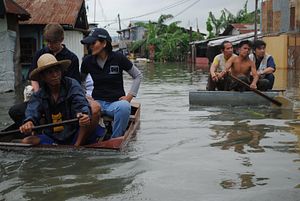The Philippines under President Rodrigo Duterte recently rejected a 250 million euro ($280 million) foreign aid package from the European Union (EU) on the grounds that the EU is trying to enforce human rights regulations in exchange for its aid. This is a clear signal that the Philippines would not take aid from any donor country if accompanied by conditions. Duterte projected this decision as a step to save the country from outside interference and safeguard its autonomy; in doing so, he has received some support in domestic circles.
The Philippines receives most of its foreign aid from Organization for Economic Cooperation and Development (OECD) countries and several development projects are running on these foreign funds. The top donor countries for Philippines in terms of bilateral aid are Japan and the United States, which account for 65 percent and 15 percent of total bilateral aid, respectively. Aid from the EU only accounts for less than three percent of total bilateral aid from donor countries.
Despite this, EU’s aid contribution is not insignificant for Philippines. Most EU aid has been targeted at reducing poverty and promoting health programs in the most backward areas of the country. Further, the EU has also been a major aid provider as far as the Mindanao peace process is concerned. The EU provided development assistance worth 130 million euros from 2007-2013 and in 2015, the EU launched a four-year development program for which it has pledged 325 million euros. Aid from the EU has had a positive impact on the country’s development, especially in conflict-stricken and impoverished areas. Moreover, the humanitarian assistance efforts from the EU reached the highest levels when the country was affected by the Typhoon Haiyan — another natural disaster could also lead to spike in much-needed funds.
The human rights check from the EU has come in the wake of the Duterte government’s anti-drug war, which has killed at least 7,000 people since Duterte came to power on June 30 last year. If Duterte’s reason for rejecting EU aid is based on supposed interference in the Philippines’ domestic affairs, such concerns would also apply to other OECD donors as well. Most of them impose conditions related to human rights and good governance on aid recipient countries. Hence, all the Philippines’ prominent donors, including Japan and the United States, could face rejection on similar grounds. The United States, for example, previously expressed concerns over the human rights violations in Philippines. However, it is interesting to note that Duterte chose only to limit the aid from the EU. That means Duterte can send a strong message to all donors but, as the EU does not figure in the list of largest donors, rejecting EU aid will not cause as much harm as targeting aid from Japan or the United States.
Duterte’s decision could be considered as a warning to all aid donors that attach conditions to their gifts. While he has singled out the EU for now, Duterte could decide to end the aid relationship with any other country trying to influence the Philippines’ domestic politics in exchange for aid. The importance of Philippine autonomy has been emphatically reiterated through this symbolic act.
The Philippines’ rejection of foreign aid with strings attached would mean that Western powers, the traditional donors, would lose ground when it comes to pressuring Duterte to mend his ways, especially on governance issues. For Duterte, political conditions would be a major roadblock at this stage, when he plans to intensify his crackdown on illegal drugs and does not want any pressure from the outside.
This move would allow important emerging economies to fill the void created by the rejection of EU aid. Undoubtedly, the most notable beneficiary of this kind of development would be China. China has been keen to forge a development partnership with the Philippines and most of its aid could be termed as no-strings-attached assistance. However, this no-strings-attached policy is only true so far as political conditions are concerned. China’s assistance is mostly tied to acquiring goods and services from China, especially in the case of the concessional loans it provides.
Realizing that the Western powers are not the only means to achieving its end, Manila has clearly pronounced its priorities. The expectation is that other donors would fill the shoes of EU or other donors that impose conditions. While this could be considered as a miscalculation by Duterte government, his position is based on his understanding of the changing power dynamics in the world order, where China’s rise is unparalleled. Realizing that the Philippines’ relationship with the United States is souring, Duterte has been moving closer to China and Russia.
Interestingly, Philippines is still on the look out for aid from the EU, but with no conditions attached. Duterte strategy could go awry if alternate external funding does not come in to the country, however.
Manila has started taking bold moves and is prioritizing its foreign policy goals based on domestic demands and the changing international power equations. However, searching for new donors will not help Manila build a case for non-interference in its internal affairs. Rather, the goal should be to stop relying on foreign aid altogether. To think that foreign aid from China would be entirely altruistic with no strings attached would not be wise. While human rights regulations might not come attached to Chinese aid, there is the chance of slipping into a debt trap that Manila would find hard to escape.
Most importantly, it will not be possible for Duterte to do away with OECD aid entirely, as most of its top donors are from the OECD. Whether Duterte’s pressure tactics would work in the Philippines’ favor or not is for time to decide.
Chithra Purushothaman is a researcher at Institute for Defence Studies and Analyses, New Delhi.
































